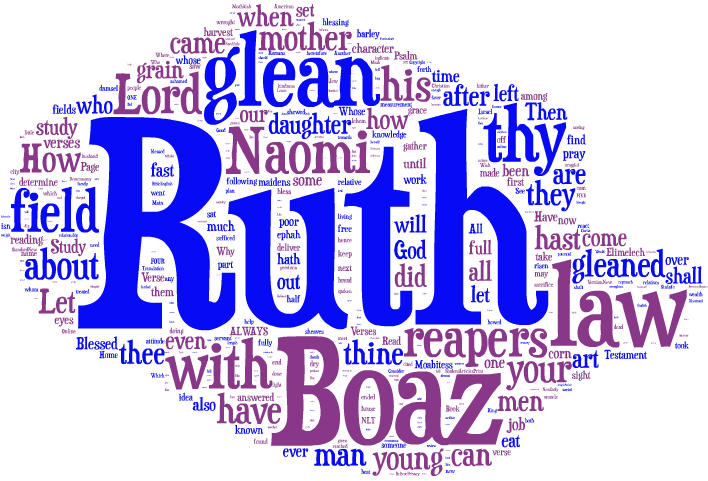Prof. Sam Lehman-Wilzig – Ruth Defines Judaism – Not Ruth-Less Rabbis
What defines Judaism and the Jewish People? Ethnicity/Race? Or Religious Culture and Practice? The Book of Ruth, read on the holiday of Shavuot, provides a complex answer.
It’s a marvelous short, biblical tale, but the ending is highly unusual, even perplexing. Ruth is a descendant of the Moabites, whom the Torah enjoins much earlier: “An Ammonite or a Moabite shall not enter into the assembly of the LORD; even to the tenth generation shall none of them enter into the assembly of the LORD forever” (Deuteronomy 23:4). Yet the Book of Ruth goes out if its way to emphasize that the greatest of Jewish kings, David (the ostensible forefather of the coming Messiah), is the great-grandson of Moabite Ruth! How can this be?
One way is to take the verse literally: the “forever” refers to ten generations, and David was more than ten generations after the desert sojourn in which God’s dictum was issued. This might be technically true, but that’s minimizing the term “forever,” although it’s something the Talmud does on numerous occasions to resolve all sort of biblical conundrums.
A second way out is to note that descent was patrilineal – only fathers were considered in censuses and generational lineage. This was true back then but is problematic in two other ways. First, if so, then why didn’t the biblical account instead relate David’s great-grandparentage to Boaz, Ruth’s husband? Second, patrilineal lineage was superseded in the Rabbinic Age by matrilineal lineage – something that the rabbis generally tried to hide, but the Bible is clearly contradicting.
A third possibility is offered by the Talmud (Yevamot 76b): the Moabites’ original sin was in not greeting the Israelites with food and water in their desert journey – but that was traditionally the function of men, so that the curse was placed only on males and not Moabite women. Clever, but this too is problematic because the Bible itself (especially in Genesis) shows how it was Rebecca who came out to offer water to Abraham’s servant and camels.
So what was the Bible’s intent in ending the story with such a clear line of descent from Ruth the Moabite? The answer lies in a problem that was rampant in Ruth’s day, for centuries beyond (think of Ezra’s injunction to divorce all the Jews’ gentile wives), and in the post-Temple, rabbinic era as well: intermarriage. Which brings us to the core question: in the eyes of the Lord, what was so problematic about “intermarriage”?
Let’s return to the Moabites. It seems that their lack of hospitality was the least of their evil: “And Israel abode in Shittim, and the people began to commit harlotry with the daughters of Moab” (Numbers 25:1). The main problem was moral, not “sociability” or even religiosity (the Moabites worshipped the god Chomesh, but it’s not clear if they were polytheistic-pagan or proto-monotheistic). Nor was it a case of ethnic “Otherness,” as the Moabites were tribally related to the Children of Israel – more precisely Lot, Abraham’s cousin: “Thus were both the daughters of Lot with child by their father. And the first-born bore a son, and called his name Moab – the same is the father of the Moabites unto this day” (Genesis 19: 36-37).
Ruth proved herself to be the complete opposite: loyal to her Jewish mother-in-law (note that Ruth’s husband, an Israelite, had also married a Moabite – Ruth herself!). But this was no mere “familial” loyalty. In perhaps the most famous of all passages in the Book of Ruth she tells Naomi: “And Ruth said: Entreat me not to leave you, and to return from following you; for wherever you go, I will go; and where you lodge, I will lodge; your people shall be my people, and your God my God” (Ruth 1: 16).
In short, what we have here is a combination of ethnicity (Lot’s child; “your people shall be my people”), social loyalty (Ruth’s to Naomi), and religion (Ruth’s eagerness to take on Naomi’s Judaism) – but no mention whatsoever regarding what we today would call “race.” In fact, quite the opposite: given that both Naomi and Ruth descended from the same family/”race” (Abraham/Lot), and yet the Torah prohibits the Israelites from “entering the assembly of the Lord,” that’s proof that race was never a consideration when questions of Jewish belonging were raised. Indeed, the greatest Jewish leader of them all, Moses, married a Gentile woman – and the Torah mentions no heavenly censure or even disappointment!
Had there been no “Ruth” (i.e., “less” of her, that’s the wish of many ultra/Orthodox rabbis who prefer adding many demands beyond Ruth’s simple statement), there would have been no King David. The historical lesson here: make it a lot easier for many more non-Jewish “Ruths” to add to the Jewish People, as long as they accept in principle what Judaism stands for.









